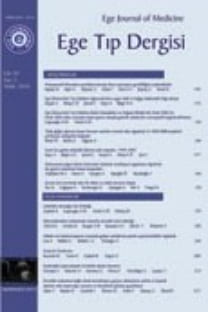Miyelodisplastik sendrom hastalığında P53 polimorfizmlerinin önemi
Importance of p53 gene polymorphisms in myelodysplastic syndrome disease
___
- 1. Kim E, Viatour P. Hepatocellular carcinoma: Old friends and new tricks. Experimental & Molecular Medicine 2020; 52: 1898-907.
- 2. Yang H-C, Kao J-H. Persistence of hepatitis b virus covalently closed circular DNA in hepatocytes: Molecular mechanisms and clinical significance. Emerging Microbes & Infections 2014; 3: 1-7.
- 3. Allweiss L, Dandri M. The role of cccdna in hbv maintenance. Viruses 2017; 9: 156. 4. Zhou F, Shang W, Yu X, Tian J. Glypican-3: A promising biomarker for hepatocellular carcinoma diagnosis and treatment. 2018; 38: 741-67.
- 5. Anatelli F, Chuang ST, Yang XJ, Wang HL. Value of glypican 3 immunostaining in the diagnosis of hepatocellular carcinoma on needle biopsy. Am J Clin Pathol 2008; 130: 219-23.
- 6. Sharov AA, Schlessinger D, Ko MS. Exatlas: An interactive online tool for meta-analysis of gene expression data. J Bioinform Comput Biol 2015; 13: 1550019.
- 7. Atay S. Integrated transcriptome meta-analysis of pancreatic ductal adenocarcinoma and matched adjacent pancreatic tissues. PeerJ 2020; 8: e10141.
- 8. Deng YB, Nagae G, Midorikawa Y, Yagi K, Tsutsumi S, Yamamoto S, et al. Identification of genes preferentially methylated in hepatitis c virus-related hepatocellular carcinoma. Cancer Sci 2010; 101: 1501-10.
- 9. Wang H, Huo X, Yang XR, He J, Cheng L, Wang N, et al. Stat3-mediated upregulation of lncrna hoxd-as1 as a cerna facilitates liver cancer metastasis by regulating sox4. Mol Cancer 2017; 16: 136.
- 10. Wang SM, Ooi LL, Hui KM. Identification and validation of a novel gene signature associated with the recurrence of human hepatocellular carcinoma. Clin Cancer Res 2007; 13: 6275-83.
- 11. Melis M, Diaz G, Kleiner DE, Zamboni F, Kabat J, Lai J, et al. Viral expression and molecular profiling in liver tissue versus microdissected hepatocytes in hepatitis b virus-associated hepatocellular carcinoma. J Transl Med 2014; 12: 230.
- 12. Roessler S, Jia HL, Budhu A, Forgues M, Ye QH, Lee JS, et al. A unique metastasis gene signature enables prediction of tumor relapse in early-stage hepatocellular carcinoma patients. Cancer Res 2010; 70: 10202-12.
- 13. Wang Y-L, Zhu Z-J, Teng D-H, Yao Z, Gao W, Shen Z-Y. Glypican-3 expression and its relationship with recurrence of hcc after liver transplantation. World journal of gastroenterology 2012; 18: 2408-14.
- 14. Maurel M, Jalvy S, Ladeiro Y, Combe C, Vachet L, Sagliocco F, et al. A functional screening identifies five micrornas controlling glypican-3: Role of mir-1271 down-regulation in hepatocellular carcinoma. 2013; 57: 195-204.
- 15. Lü Z-L, Luo D-Z, Wen J-M. Expression and significance of tumor-related genes in hcc. World journal of gastroenterology 2005; 11: 3850-4.
- 16. Pan C, Wang X, Chen W, Tao C, Xu X, Jin L, et al. Reevaluation of glypican-3 as a prognostic marker in hcc using x-tile software. Med Oncol 2015; 32: 359.
- 17. Fu S-J, Qi C-Y, Xiao W-K, Li S-Q, Peng B-G, Liang L-J. Glypican-3 is a potential prognostic biomarker for hepatocellular carcinoma after curative resection. Surgery 2013; 154: 536-44.
- 18. Jeon Y, Kim H, Jang ES, Hong S, Kim JW, Yoon Y-S, et al. Expression profile and prognostic value of glypican-3 in post-operative south korean hepatocellular carcinoma patients. APMIS 2016; 124: 208-15.
- 19. Cui X, Li Z, Gao PJ, Gao J, Zhu JY. Prognostic value of glypican-3 in patients with hbv-associated hepatocellular carcinoma after liver transplantation. Hepatobiliary Pancreat Dis Int 2015; 14: 157-63.
- 20. Ning S, Bin C, Na H, Peng S, Yi D, Xiang-hua Y, et al. Glypican-3, a novel prognostic marker of hepatocellular cancer, is related with postoperative metastasis and recurrence in hepatocellular cancer patients. Molecular Biology Reports 2012; 39: 351-7.
- 21. Liang J, Ding T, Guo ZW, Yu XJ, Hu YZ, Zheng L, Xu J. Expression pattern of tumour-associated antigens in hepatocellular carcinoma: Association with immune infiltration and disease progression. British journal of cancer 2013; 109: 1031-9.
- 22. Moudi B, Heidari Z, Mahmoudzadeh-Sagheb H. Meta-analysis and systematic review of prognostic significance of glypican-3 in patients with hepatitis b-related hepatocellular carcinoma. Virusdisease 2019; 30: 193-200.
- ISSN: 1016-9113
- Yayın Aralığı: Yılda 4 Sayı
- Başlangıç: 1962
- Yayıncı: Ersin HACIOĞLU
Kraniyal manyetik rezonans görüntüleme istenilen olguların retrospektif özellikleri
Hilal AYDIN, Selçuk YAZICI, Ezgi ÖZDEN, Gülen DEMİRPOLAT
Mide kanserli hastaların demografik özelliklerinin sağ kalıma etkisi
Andaç KARADENİZ, Mehmet BİLİCİ, Melih ŞİMŞEK
Nadir görülen bir pnömotoraks olgusu: katamenial pnömotoraks
Ufuk ÇAĞIRICI, Hasan YAVUZ, Ayşegül ÇEVİK ERGÖNÜL, Tevfik İlker AKÇAM
Oldukça nadir bir koroner arter anomalisi: Non-koroner sinüsten çıkan sol ana koroner arter
Cihat PINARCI, Selen BAYRAKTAROĞLU
Fatih DİNÇER, Gülşah Selvi DEMİRTAŞ, Mehmet GÖKÇÜ, Muzaffer SANCI
Endometrium kanserli obez hastalarda laparoskopik ve açık cerrahinin karşılaştırılması
Ceren SANCAR, Nuri YILDIRIM, Ahmet BİLGİ, Sevki GÖKÜLÜ, Levent AKMAN, Mustafa Coşan TEREK, Ahmet Aydın ÖZSARAN
Suriyeli mülteci ve türk kadınlarının perinatal eğilimleri ve obstetrik sonuçları
Hande İLERİ, Suna YILDIRIM KARACA, Ayşe Rabia ŞENKAYA, Alper İLERİ, Can ATA
Fuchs heterokromik iridosiklit hastalarında kornea biyomekaniği ve kornea değerlendirilmesi
Semir YARIMADA, Cumali DEĞİRMENCİ, Melis PALAMAR, Suzan GÜVEN YILMAZ, Halil ATEŞ
